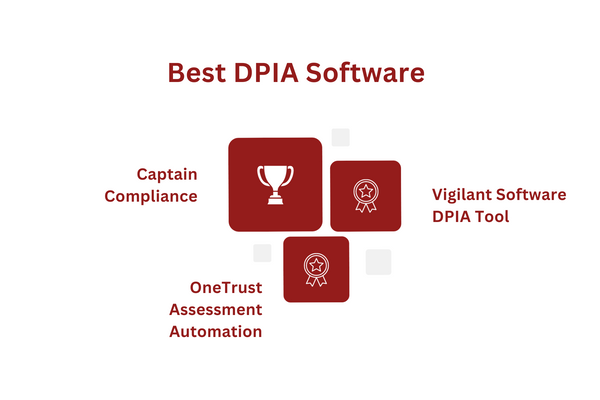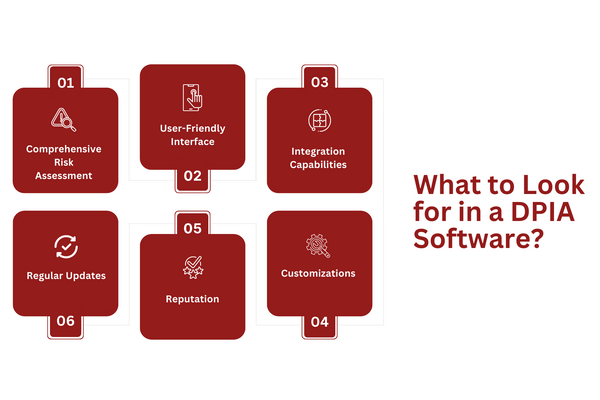
Are you in search of the perfect DPIA software to streamline your data protection impact assessments? Explore our top picks that will not only simplify compliance with GDPR but also turn complex processes into a breeze for your business.
This article aims to provide an understanding of DPIA software, along with a list of the best DPIA software choices for your business.
Data Protection Impact Assessment (DPIA) software is a specialized tool designed to streamline and automate the complex process of conducting DPIAs, which are mandatory under various data privacy regulations like the GDPR. These platforms guide organizations through a structured methodology to identify, assess, and mitigate risks associated with new data processing activities or technologies. They typically provide customizable templates that ensure all regulatory requirements are met, prompt users with a series of questions about the nature, scope, context, and purposes of processing, and help identify the categories of personal data involved. By centralizing this information, the software ensures consistency across assessments and creates an auditable record of the risk management process, which is critical for demonstrating compliance to supervisory authorities.
The core functionality of DPIA software extends to facilitating the identification and evaluation of privacy risks. It often includes built-in risk libraries, allowing users to select common risks and corresponding mitigation strategies. Furthermore, these platforms enable collaboration among various stakeholders, such as legal, IT, and business teams, to ensure a comprehensive assessment. Once risks are identified, the software helps document the proposed mitigation measures and track their implementation. This automation reduces manual effort, minimizes the potential for human error, and ensures that DPIAs are conducted thoroughly and consistently across an organization, helping to proactively resolve privacy compliance requirements before new projects are launched.
Here are some key ways DPIA software works:
-
Guided Questionnaires: Provides a step-by-step process with predefined questions to gather all necessary information about a data processing activity.
-
Automated Risk Identification: Helps flag potential privacy risks based on the characteristics of the data processing (e.g., sensitive data, large-scale processing, new technologies).
-
Risk Scoring and Prioritization: Assigns a risk score to identified threats and helps prioritize them for mitigation efforts.
-
Collaboration Tools: Facilitates input and review from multiple departments (legal, IT, security, business units).
-
Mitigation Tracking: Allows for the documentation and tracking of proposed and implemented risk mitigation strategies.
-
Reporting and Documentation: Generates comprehensive reports that serve as an auditable record of the DPIA process for regulatory compliance.
-
Template Management: Offers customizable templates to ensure all regulatory requirements (e.g., GDPR Article 35 specifics) are covered.
-
Integration: Can integrate with other privacy management tools, such as data mapping and consent management, for a more holistic view.
Key Takeaways
DPIA software plays an important role in ensuring businesses handle data and follow regulations. It functions as a safety net identifying risks before they escalate into compliance issues.
When selecting DPIA software, it is important to opt for one that’s user-friendly, compatible with your tools, and newly updated, like Captain Compliance.
Trust and reputation hold weight. It is wise to choose software that other businesses rely on and speak of. Choose software with a strong reputation, much like selecting a highly-rated restaurant.
Why Do Businesses Need to Do a DPIA?

With GDPR DPIA and LGPD DPIA mandates, many businesses that process sensitive data often need to do DPIAs. You need to do DPIAs because you must safeguard data from falling into the wrong hands.
DPIA, also known as Data Protection Impact Assessment, is a safety check for data handling practices. Its purpose is to assist businesses in comprehending how they use data and identifying any risks involved.
By conducting a DPIA, businesses can identify issues before they materialize. So they can prevent errors that might result in data leaks or breaches.
But DPIA serves more than risk identification purposes. It also plays a role in establishing trust. When businesses conduct a DPIA, it demonstrates to their consumers and partners that they rank data protection.
Furthermore, in many jurisdictions, conducting DPIAs is mandatory, aligning with DPIA requirements. Legal frameworks like GDPR in Europe require certain types of data processing to undergo DPIAs. So, by carrying out a DPIA, businesses can ensure compliance with the law and steer clear of penalties.
What is a DPIA Software?
Companies now handle an increasing amount of information. With this comes the responsibility to safeguard and use this data.
The Data Protection Impact Assessment (DPIA) process helps businesses identify and mitigate risks associated with data protection in a project. However, conducting a DPIA can be time-consuming and complex.
This is where DPIA software comes into play. A DPIA software is a data compliance solution that helps businesses do these assessments. By using these tools, businesses can outsource compliance to ensure corporate compliance.
You can ensure compliance with regulations, like GDPR, while also prioritizing the protection of personal information by using this software.
Here’s what good DPIA software can offer a business:
Simplified Process: Conducting a DPIA is complex, especially for big organizations with numerous databases and varying types of personal data to review. A good DPIA software simplifies the process by providing an easy-to-use solution that standardizes how you assess risks.
Time Saved: Since it automates most tasks involved in conducting a risk assessment (e.g., data mapping or evaluating compliance levels), this saves lots of time, which can be redirected towards other important areas within your business.
Expert Support And Guidance: Some DPIA software has templates and guidelines set on international standards to assist users with minimal knowledge of data protection. These tools might also provide professional support for risk mitigation strategies.
Ensuring Compliance: DPIA software enables businesses that process sensitive or large amounts of personal data, such as healthcare companies or financial institutions, to regularly perform audits, ensuring they are compliant with regulations like GDPR.
Enhancing Data Security: By identifying potential risks and vulnerabilities early on, DPIA software can help improve the overall data security of an organization. This reduces the likelihood of a breach occurring in the future.
Automated Reporting: These tools often include reporting features that automatically generate audit reports for stakeholders or regulators as required by specific compliance frameworks like GDPR.
Regular Updates: A good DPIA tool gets regularly updated according to new regulations, thus maintaining your company’s ongoing legal support, whether it be national policy changes or international directive enforcement updates.
Best DPIA Software

In this section, we’ll explore a few of the top DPIA software choices that can help your business with ensuring compliance. By automating and simplifying your company’s procedures, this software ensures regulatory adherence and optimizes operational efficiency.
Captain Compliance
Captain Compliance is a leader in data protection compliance services and is highly sought after by businesses due to its ability to provide the best tools for compliance with regulations such as GDPR, CCPA, and other compliance frameworks.
Our software is designed to be user-friendly, making it easier for businesses to navigate and adhere to data regulations without any confusion.
Additionally, Captain Compliance is up to date on the latest data privacy laws, keeping businesses informed and enabling them to stay compliant.
Vigilant Software DPIA Tool
Vigilant Software offers a DPIA tool that operates in the cloud. It has been designed with simplicity in mind, making it easy for businesses to use. This DPIA tool assists businesses in planning their data security measures, identifying risks, and ensuring compliance with GDPR regulations.
They provide step-by-step guidance that allows businesses to address all aspects of data protection and maintain the safety of their information.
OneTrust Assessment Automation
OneTrust offers a solution that assists businesses in ensuring the security of their data. This tool simplifies the process of conducting Privacy Impact Assessments (PIA) and Data Protection Impact Assessments (DPIA) by breaking them down into steps.
It enables businesses to comply with regulations such as CCPA, GDPR, and others.
The advantageous aspect? Its flexibility allows businesses to customize it according to their requirements. This ensures that they handle their data in a manner for their unique needs.
TrustArc Assessment Manager
TrustArc offers a solution to safeguard data for businesses. This valuable tool provides guidance on conducting Privacy Impact Assessments (PIA), identifying risks, and ensuring compliance with data regulations.
It caters to businesses seeking a customized approach to data management. By choosing TrustArc, businesses can maintain their methods while prioritizing the security of their data.
SAI360 Integrated GRC
SAI360 offers a solution designed to assist businesses in establishing regulations and ensuring safety. This tool provides guidance on developing a privacy plan through Privacy Impact Assessments (PIAs) and assessing risks.
It is particularly beneficial for businesses seeking a tool to aid in rule-making and maintaining an environment. For those looking for assistance with both rule setting and risk management, SAI360 is highly recommended.
Mandatly Intelligent Assessment
Mandate offers a solution to assist businesses in managing their data. Their tool utilizes PIA (Privacy Impact Assessment) to provide guidance on identifying and addressing data-related requirements and issues.
This is particularly beneficial for businesses venturing into data safety for the time as Mandatly can offer concise steps to help them navigate this unfamiliar territory.
Privado
Privado is a platform designed to assist businesses in navigating data regulations and GDPR. It includes a feature that enables consumers to assess the security of their data. This tool is tailored for businesses, allowing them to track the flow of their data and manage cookie permissions.
If a business operates online and requires support with data management and cookies, Privado is available to provide help.
What to Look for in a DPIA Software?

Selecting the DPIA software for your business can be a big decision. The wide range of options can feel a bit overwhelming. There’s no need to worry, though!
If you take into account these aspects when deciding on DPIA software, you’ll be more likely to pick the best fit for your company.
Comprehensive Risk Assessment
When you’re choosing DPIA software, it’s crucial to pay attention to how it assesses risks.
It’s similar to conducting a safety check for your data. The software should be thorough and identify any issues. If there’s a possibility of something going wrong, the software should be able to detect it.
Once these risks are identified, businesses can take measures to address them. This allows them to resolve problems before they escalate. Essentially, the software should act as a guardian, constantly observing and assisting businesses in safeguarding their data.
User-Friendly Interface
Software usability is incredibly important. A DPIA software should be like a teacher who simplifies things.
Even if someone isn’t well-versed in technology, they should still feel at ease using it. We don’t need jargon or confusing buttons but, instead, straightforward steps.
Imagine navigating through the software effortlessly as flipping through a book. That’s the kind of experience we should strive for. In summary, good DPIA software should be user-friendly for everyone, making the task of safeguarding data privacy a little easier and less stressful.
Integration Capabilities
Think of DPIA software as a friend you’re inviting to a gathering. You’d want this friend to get along well with your other friends, right?
That’s how DPIA software should be when it comes to collaborating with the other tools you use. It should be seamless, and it should fit in like fitting puzzle pieces together.
Your DPIA software should effortlessly connect with them without any hassle. It’s like constructing a bridge between these tools. When they work in harmony, it saves you time that would otherwise be spent trying to align things. That ultimately translates into frustrations for you.
Customizations
Imagine if shoes were only available in one size. That wouldn’t be suitable for everyone, right?
Just like people have shoe sizes, businesses have varying needs. DPIA software should acknowledge this fact. It should allow businesses to make adaptations that perfectly align with their requirements.
The software should be flexible and moldable, ready to accommodate the desires of each business. In terms of good DPIA software empowers businesses to personalize it according to their preferences.
Reputation
When choosing a movie to watch, many of us rely on reviews first. We want to know what others think about it.
The same principle applies when selecting DPIA software. It’s wise to consider what other businesses have experienced with it. Are they satisfied? Have they encountered any issues? If many companies give it a thumbs up and speak about it, that’s a sign of trustworthiness and effectiveness.
Regular Updates
The landscape of data privacy security is constantly evolving. New regulations can arise unexpectedly. DPIA software must keep pace with these changes.
The software should regularly update information and tools so that it remains current and equipped against emerging challenges.
Closing
Regardless of the size of your business, it’s crucial to ensure that any personal information you handle remains secure and protected.
However, given the number of regulations, rules, and potential threats – navigating this landscape can sometimes feel like finding your way through a complex maze. This is where tools like Captain Compliance’s DPIA software shine.
Captain Compliance is here to lend a hand. With our easy-to-use software with seamless compliance and an earned reputation for excellence, Captain Compliance can be your trusted partner on your journey toward personal data protection.
So why delay? Take that leap towards a more compliant future for your business today! Reach out to us today.
FAQs
What is the primary purpose of DPIA software?
DPIA software is created to assist businesses in recognizing and minimizing the risks linked to data protection.
It simplifies the procedure of conducting Data Protection Impact Assessments, guaranteeing compliance with regulations and giving priority to safeguarding information.
Considering implementing DPIA software? Captain Compliance can guide you through the process. Reach out today!
How often should businesses conduct a DPIA?
Businesses are advised to perform a Data Protection Impact Assessment (DPIA) whenever they implement data processing activities or technologies that could potentially endanger an individual’s privacy rights.
Consistent evaluations guarantee that businesses adhere to regulations and mitigate any risks that may arise.
Unsure about when to conduct your next DPIA? Check our guide to learn everything you should know.
Can DPIA software replace the need for a data protection officer (DPO)?
Although DPIA software is useful in evaluating risks and ensuring compliance, it cannot fully replace the expertise and discernment of a Data Protection Officer (DPO).
A DPO plays a role in overseeing operations, ensuring compliance, and acting as a liaison between data subjects and regulatory bodies.
Thinking of hiring a DPO or need advice on data protection roles? Check out our “Does My Business Need a Data Protection Officer?”
How does DPIA software integrate with other business tools?
A reliable DPIA software should smoothly integrate with tools and systems employed within your business, ranging from data security solutions to business software. This guarantees an approach to safeguarding data and simplifies workflows.
Looking for a DPIA solution that integrates effortlessly with your existing tools? Captain Compliance can help. Reach out to us today for a free trial!